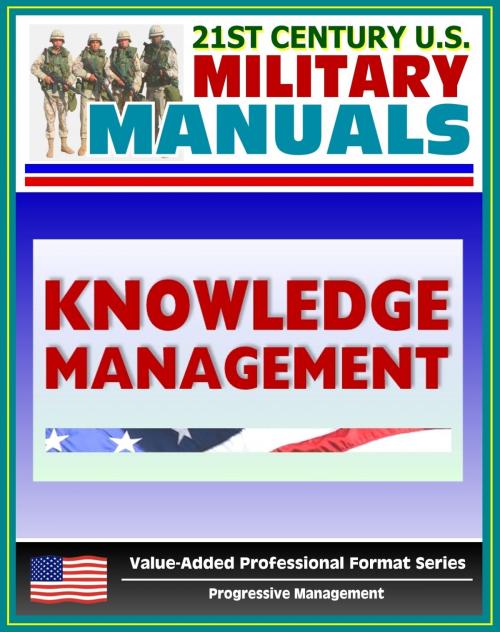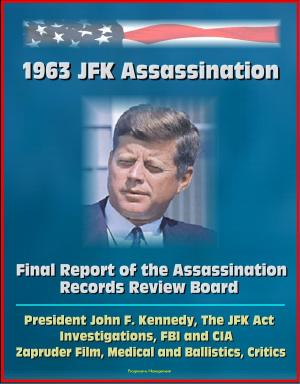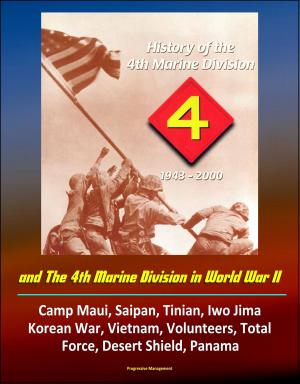U.S. Army Field Manual: Knowledge Management Section (FM 6-01.1) - Integrating KM into Operations of Brigades, Divisions, and Corps
Nonfiction, History, Military, United States| Author: | Progressive Management | ISBN: | 9781476140728 |
| Publisher: | Progressive Management | Publication: | May 5, 2012 |
| Imprint: | Smashwords Edition | Language: | English |
| Author: | Progressive Management |
| ISBN: | 9781476140728 |
| Publisher: | Progressive Management |
| Publication: | May 5, 2012 |
| Imprint: | Smashwords Edition |
| Language: | English |
This manual provides doctrine for the organization and operations of the knowledge management (KM) section. It establishes the doctrinal principles, tactics, techniques, and procedures necessary to effectively integrate KM into the operations of brigades, divisions, and corps.
FM 6-01.1 has an introduction and three chapters. The introduction expands on the manual's purpose and summarizes the doctrine it contains. Chapter 1 discusses the basic KM definitions, principles, and concepts. It concludes by discussing the relationship among battle command, knowledge management, and information management as well as the KM process in the operational Army and in Army force generation (ARFORGEN). Chapter 2 provides doctrine for KM section organization and functions. It also addresses Soldier duties and responsibilities. Chapter 3 discusses the KM process and associated techniques and procedures that KM sections use to improve KM within staffs. Appendix A contains checklists for content management. Appendix B contains techniques for adapting the after action review technique used during training to support learning during operations. Appendix C includes interviewing techniques for collecting observations, insights, and lessons from operations. Appendix D provides a sample agenda for KM working groups.
FM 6-01.1 applies to KM sections in Army headquarters from brigade through corps. ("Brigade" includes brigade combat teams, support brigades, functional brigades, and multifunctional brigades.) The manual applies primarily to KM section members. Finally, this manual provides the doctrinal guidance for commanders, staffs, and leaders of the organizations responsible for KM in operations.
Army headquarters serving as the headquarters of a joint force land component command or joint task force may adapt this manual with appropriate modifications until joint doctrine or guidance is provided and technology and doctrine support operations with multinational partners. Army technology is not mature enough to support multinational forces, and joint doctrine and technology do not yet allow KM interoperability.
This manual provides doctrine for the organization and operations of the knowledge management (KM) section. It establishes the doctrinal principles, tactics, techniques, and procedures necessary to effectively integrate KM into the operations of brigades, divisions, and corps.
FM 6-01.1 has an introduction and three chapters. The introduction expands on the manual's purpose and summarizes the doctrine it contains. Chapter 1 discusses the basic KM definitions, principles, and concepts. It concludes by discussing the relationship among battle command, knowledge management, and information management as well as the KM process in the operational Army and in Army force generation (ARFORGEN). Chapter 2 provides doctrine for KM section organization and functions. It also addresses Soldier duties and responsibilities. Chapter 3 discusses the KM process and associated techniques and procedures that KM sections use to improve KM within staffs. Appendix A contains checklists for content management. Appendix B contains techniques for adapting the after action review technique used during training to support learning during operations. Appendix C includes interviewing techniques for collecting observations, insights, and lessons from operations. Appendix D provides a sample agenda for KM working groups.
FM 6-01.1 applies to KM sections in Army headquarters from brigade through corps. ("Brigade" includes brigade combat teams, support brigades, functional brigades, and multifunctional brigades.) The manual applies primarily to KM section members. Finally, this manual provides the doctrinal guidance for commanders, staffs, and leaders of the organizations responsible for KM in operations.
Army headquarters serving as the headquarters of a joint force land component command or joint task force may adapt this manual with appropriate modifications until joint doctrine or guidance is provided and technology and doctrine support operations with multinational partners. Army technology is not mature enough to support multinational forces, and joint doctrine and technology do not yet allow KM interoperability.















